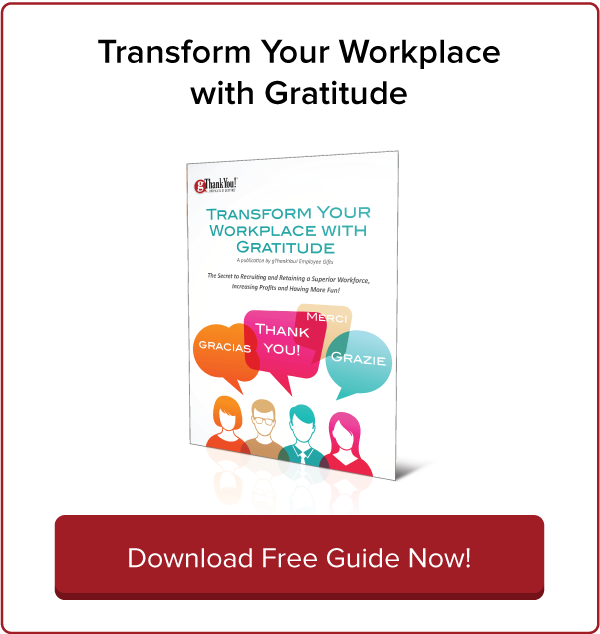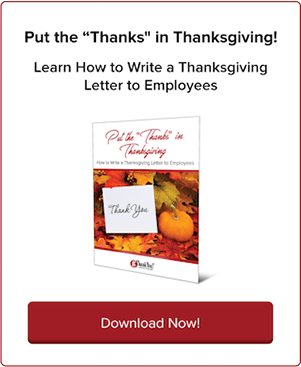Sorry. It’s one small word that may be holding your team back from building a stronger culture of workplace gratitude. Apologies have their place, but people often say “sorry” when “thank you” would be better. How often do you find yourself apologizing when it’s possible to be reworded into a more positive message?
Think of it this way… If you had to choose to be surrounded by an abundance of genuine “thank you” messages among colleagues or a lot of people saying, “sorry” all the time, what would you prefer? (We think we know the answer.) However, it takes a little bit of awareness and effort to rewire our tendencies.
Thanking someone has an expansive power that “sorry” doesn’t. Gratitude makes other people feel good. It gets passed on and starts a chain reaction to happiness. Sorry is commonly used in situations where it doesn’t need to be, and a more positive workplace culture can be built on this paradigm shift.
 When to Say, “Thank You” Instead of “Sorry”
When to Say, “Thank You” Instead of “Sorry”
Casual over-apologizing is all too common. For example, if you’re running late to an appointment, it’s better to graciously thank someone for their patience instead of breathlessly exclaiming, “Sorry I’m always late!” It sets a better tone for the remainder of the interaction.
“Sorry” can, in essence, reject someone’s nice gesture. If you perform an act of kindness for someone, would you rather be thanked for your thoughtfulness or hear an apology for causing the trouble? The “thank you” sends a clear message of gratitude, while “sorry” sends a confusing message that may leave someone feeling less than appreciated.
Workplace gratitude benefits everyone, so it’s vital that you’re not undermining it with casual apologies. Here are some examples to try this week.
When “Thank You” works better than “Sorry” in the workplace:
1. “Sorry you had to cover for me again.”
How is the recipient of this statement supposed to respond? “Er, sorry you’re sorry?”
Better: “I know you’ve been putting in extra hours to cover for me and I really appreciate it. Thank you for being there.”
2. “Sorry I’m not making a lot of sense.”
This fits in the category of the “sorry for existing” apology. It falsely elicits pity when you’re actually seeking their understanding.
Better: “Thank you for listening to me. Do you have any questions?”
3. “Sorry you had to come in on your day off to fix this.”
“It’s no big deal” will be the likely response, even if it is a big deal. What the employee really wants to hear is your recognition for their sacrifice.
Better: “Thank you for coming in on your day off to fix this. We really appreciate it. Let me get you a cup of coffee.” Then, publicly acknowledge the employee’s above-and-beyond work in the company newsletter, at a weekly staff meeting, or in another internal forum. Better yet, provide a gift certificate and a thank you note from a manager, colleague, or organizational leader.
4. “Thank you so much!” (said with the inflection of an apology)
If your appreciation sounds like an apology, you’re undermining the sincerity of your appreciation. It’s valid to feel bad about imposing on someone, but you’re better off communicating your feelings transparently and specifically. Tell the truth of the situation.
Better: “You’re picking up a lot of extra shifts for us during this busy period. We’ve noticed your dedication and willingness to rearrange your schedule. It means a lot to the whole team. Thank you.”
Why “thank you” can be more effective than “sorry”
- Boosts self-esteem: Keller Center for Research found that expressing gratitude can make the recipient feel good about themselves and their contribution. An apology can misconstrue the positive intention of the comment.
- Shifts to positive: “Thank you” acknowledges a situation while focusing on the positive aspect, like someone’s patience or helpfulness. “Sorry” can dwell on the negative, like a mistake or inconvenience.
- More genuine: We often overuse “sorry” for minor things, which can lessen its impact. A sincere “thank you” is more likely to be appreciated because it’s more specific.
Educate Leadership About the Power of Workplace Gratitude
Leaders set the tone for workplace culture. They’re the ones modeling “thank you” vs. “sorry.” Employees pick up on leaders who choose sincere casual gratitude over a casual apology. It’s important that supervisors and company leaders are well-versed in the power of gratitude. Why?
- Increased Employee Performance: A study by Motivosity showed a 196% increase in employee Net Promoter Score (eNPS) after implementing gratitude practices. This score reflects an employee’s willingness to recommend their company to others.
- Improved Well-being: Research from the Coach Foundation suggests gratitude can lead to better sleep, increased optimism, and reduced stress. This can contribute to a more positive and healthy work environment.
- Higher Engagement: According to WEX Inc., studies show that employees feel more valued and appreciated when gratitude is expressed, which leads to increased engagement and motivation. Happy employees are more likely to go the extra mile.
For leaders who are working to improve their leadership or employee engagement skills, we have a great resource for you! Our free eBook, Enthusiastically Engaged, is a collection of top blogs, newsletters, and podcasts dedicated to HR, leadership, and employee engagement. This curated list offers insights from experts such as Alexander Kjerulf and Douglas Conant, as well as leading communities like Achievers and TalentCulture. Whether you’re looking for ideas for building gratitude, leadership strategies, or HR trends, this guide serves as a handy tool for anyone aiming to enhance workplace culture.
Learn More About gThankYou Certificates of Gratitude:
Top Photo by Brett Jordan on Unsplash
People Working Photo by Jason Goodman on Unsplash


 When to Say, “Thank You” Instead of “Sorry”
When to Say, “Thank You” Instead of “Sorry”







